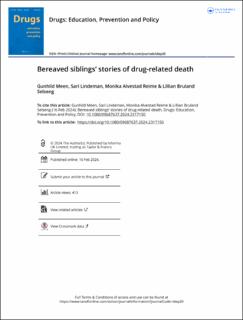Bereaved siblings’ stories of drug-related death
Peer reviewed, Journal article
Published version
Permanent lenke
https://hdl.handle.net/11250/3126086Utgivelsesdato
2024Metadata
Vis full innførselSamlinger
- Import fra CRIStin [3604]
- Institutt for velferd og deltaking [1007]
Originalversjon
10.1080/09687637.2024.2317150Sammendrag
Background: Deaths caused by problematic substance use are an international concern. In bereavement, meaning-making is an essential activity embedded in social and cultural contexts. There is a lack of knowledge about how sociocultural perceptions and stigma associated with problematic substance use and drug-related deaths influence how bereaved siblings give meaning to the loss of their loved ones. Methods: This article investigates bereaved siblings’ meaning-making stories about the drug-related death of their brother or sister. The study involves in-depth interviews with 14 bereaved siblings, analysed via a discursive psychologic perspective. Results: Participants used four groups of sense-making stories about drug-related deaths: ‘death as the only outcome,’ ‘death caused by difficulties in the family,’ ‘death caused by lack of public help’, and ‘stories of uncertainty and doubt.’ Conclusion: By identifying culturally constructed storylines used by participants about their siblings’ deaths, positionings of blame and responsibility are displayed, leading to social consequences that may affect how siblings bereaved by drug-related deaths cope with their loss and adapt to life without their brother or sister.

